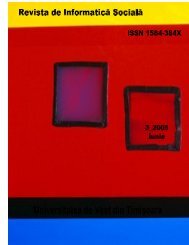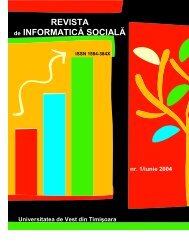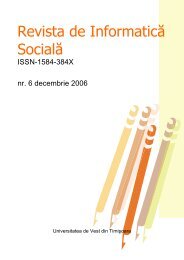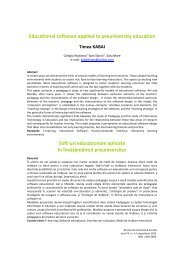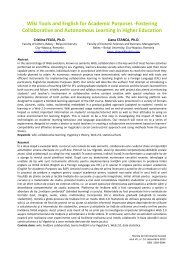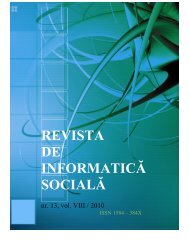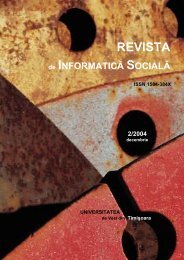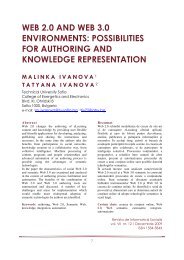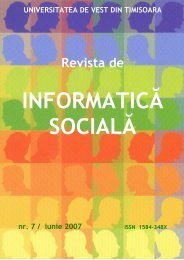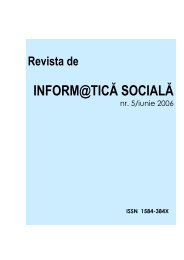No 14 - Journal of Social Informatics / Revista de Informatica Sociala
No 14 - Journal of Social Informatics / Revista de Informatica Sociala
No 14 - Journal of Social Informatics / Revista de Informatica Sociala
You also want an ePaper? Increase the reach of your titles
YUMPU automatically turns print PDFs into web optimized ePapers that Google loves.
Figure 3 - The role <strong>of</strong> WIP in each stage <strong>of</strong> the research-based learningIn the second stage, the teacher <strong>of</strong>fers to the stu<strong>de</strong>nts the opportunity for create their own questions,since related to the theme chosen in the previous stage. While the theme remains in the focus, theteacher, taking into account concerns expressed by stu<strong>de</strong>nts, continues to stimulate their thinking inor<strong>de</strong>r they can be able to <strong>de</strong>ci<strong>de</strong> what will be investigated. The stu<strong>de</strong>nts must to elaborate thequestion – or questions - that induces the investigative activity. In the structure <strong>of</strong> WIP, stu<strong>de</strong>ntswill find potential issues that may help them to gui<strong>de</strong> the research.After the question for the inquiry is ready, in the third stage the teacher will support stu<strong>de</strong>nts in the<strong>de</strong>finition <strong>of</strong> investigative procedures that they intend to adopt, which inclu<strong>de</strong>s choosing the types<strong>of</strong> data that will be consi<strong>de</strong>red for analysis. The stu<strong>de</strong>nts <strong>de</strong>fine the procedures they will use inresearch. The teacher should ensure that procedures are rigorous, consistent with a research methodappropriate to the question to which the answer will be sought in the research. In the structure <strong>of</strong> theWIP some potential procedures can be pointed out, especially including the types <strong>of</strong> data nee<strong>de</strong>d inthe research.Defined the question to which they will look for an answer and set the procedure most appropriated,stu<strong>de</strong>nts begin the search for online data, advancing on the research. In the fourth stage <strong>of</strong> the WIP,the stu<strong>de</strong>nts' ability to perform advanced searches on the Internet - using search engines like Googleand Bing - will be essential. At that moment the teacher must to assist stu<strong>de</strong>nts in seeking data ononline sources, being essential to ensure their credibility. It is absolutely essential that the sourcesare reliable. The teacher can participate with stu<strong>de</strong>nts in the pursuit <strong>of</strong> data sources. The WIPproposal does not eliminate, however, the possibility <strong>of</strong> the teacher <strong>of</strong>fer to the stu<strong>de</strong>nts some preselectedsources as examples. In this stage, the WIP <strong>of</strong>fers a list <strong>of</strong> potential sources <strong>of</strong> online data.The fifth stage is the time for stu<strong>de</strong>nts manipulate and analyze the data collected on the Internet.The teacher must ensure that stu<strong>de</strong>nts are able to use the tools necessary to analyze data that theycollect online. If numerical data are used, may be necessary for stu<strong>de</strong>nts to be able for using aspreadsheet or statistical s<strong>of</strong>tware. If stu<strong>de</strong>nts are <strong>de</strong>aling with data that are not numeric, s<strong>of</strong>twarefor generating a conceptual map or for database management may be appropriated. If necessary, theteacher will ensure that there is a previous training <strong>of</strong> stu<strong>de</strong>nts for appropriate use <strong>of</strong> the s<strong>of</strong>twarethey choose as more appropriated. In the fifth stage, the structure <strong>of</strong> the WIP can <strong>of</strong>fer someexamples <strong>of</strong> handled data.The next task <strong>of</strong> the stu<strong>de</strong>nts is to draw their own conclusion in the investigation. And as theinvestigation has no meaning if the conclusion is not a<strong>de</strong>quately communicated, in the sixth stagethe stu<strong>de</strong>nts will report their findings, being essential that the conclusion they reach is properlysupported in the data they collected. The results will be presented in various forms: text, graphics



